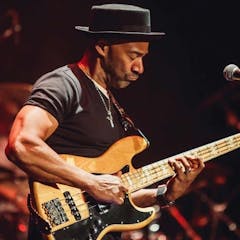
Marcus Miller
Jazz / Blues
Upcoming Events
Details
Description
Marcus Miller – a two-time GRAMMY Award winner and UNESCO Artist for Peace – is not only an exceptional musician – a multi-instrumentalist and world-renowned bassist – but also a highly-gifted composer and producer. The legendary Tutu album he wrote and produced for Miles Davis sealed his international fame when Miller was only twenty-five. Since then he has continued collaborating with artists as varied and talented as Eric Clapton, George Benson, Luther Vandross, Roberta Flack, Aretha Franklin, Chaka Khan, Jay-Z, Wayne Shorter, Al Jarreau, Stanley Clarke, George Duke, Brian Ferry and Herbie Hancock (to name only a few). At the same time, he has produced his own albums, among them The Sun Don’t Lie, M2, Silver Rain, Free, A Night in Monte Carlo (with the Monte Carlo Philharmonic Orchestra), and Renaissance, giving him occasion to tour internationally with young musicians whose talents he's recognized (as Miles did for him, Herbie Hancock, Wayne Shorter, and others). You can hear Miller's radio show Miller Time every Sunday night on SiriusXM's RealJazz.
Marcus’ new project Afrodeezia—which was inspired by Miller’s role as a UNESCO Artist For Peace and spokesperson for the organization’s Slave Route Project—was recorded in locations around the world including Morocco, Paris, Rio de Janeiro, New Orleans and Los Angeles, and features a wide range of guests including rapper Chuck D., vocalist Lalah Hathaway, keyboardist Robert Glasper, trumpeters Etienne Charles and Ambrose Akinmusire, guitarists Keb’ Mo’ and Wah Wah Watson, bassist/producer Mocean Worker, organist Cory Henry (Snarky Puppy), and cellist Ben Hong, as well as musicians from Africa, South America and the Caribbean. Miller’s core band includes saxophonist Alex Han, trumpeter Lee Hogans, pianist Brett Williams, guitarist Adam Agati, and drummer Louis Cato.
“It was after visiting the House of Slaves on Gorée Island that I composed “Gorée,” explains Miller, referring to the powerful track featured on his previous album Renaissance. “Onstage I felt the need to say what I had been feeling in Senegal. I wanted people to understand that this tune spoke not only of the slave tragedy but, through the music especially, that these people who suddenly found themselves at the bottom of a ship’s hold had discovered a way to survive, and were able in time to transform their distress into joy. Shortly after my trip to Gorée, UNESCO named me an Artist for Peace, and made me the spokesperson for the Slave Route Project. That was when I started thinking about Afrodeezia.”
“The power of music has no limits,” states Miller. “Through spirituals, jazz and soul we were able to preserve our history, because all the rest had been erased. What I wanted most was to go back to the source of the rhythms that make our musical heritage so rich, to follow them like footprints from their beginnings in Africa all the way to the United States. That journey took us from Mali to Paris, from New Orleans to Sao Paulo and across the Caribbean.”
“For this project, I collaborated with musicians from West Africa, South America, the Caribbean, the southern U.S. and the large northern cities of the U.S. This is my way of paying tribute to the long journey of my African ancestors who became African-Americans. The melodies and rhythms they carried with them from Africa have EXPLODED into a ‘dizzying’ array of musical styles and genres that have changed the world.”
Top Marcus Miller Songs of All Time
